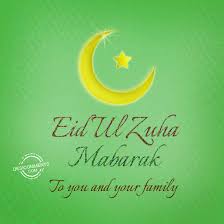Id-ul-zuha ( Bakrid )
Id ul zuha ( Bakr id ) is celebrate mostly in september month in all India.

Id-ul-Zuha is also called Id-ul-Adha in Arabic and Bakr-Id in India. It is the tradition of sacrificing a goat or ‘bakr’ in Urdu. Id-ul-Zuha means a festival of sacrifice. On this day, Muslims sacrifice a goat to commemorate the sacrifice of Prophet Ibrahim, who willingly agreed to sacrifice his son at the command of God. Prophet Ibrahim was about to sacrifice his son but it was revealed to him that it was a test of his faith and he could sacrifice a ram instead. The festival also concurs with the Haj pilgrimage in Mecca. Prayers are offered in the mosques and the sacrificial meat is then distributed. Special dishes are prepared and served among family members and friends.
The festival is annually celebrated on the 10th, 11th and 12th day of the last Islamic month, Dhu al-Hijjah” in the lunar Islamic calendar. The celebrations begin after the annual Haj pilgrimage to Mecca in Saudi Arabia by Muslims worldwide as they come down from Mount Arafat. The date falls about 70 days after the end of the Ramadan month i.e. Eid-ul-Fitr. Rituals last until sunset of the 12th day of Dhu al-Hijjah.
The Festival is celebrated with great enthusiasm among Muslims worldwide. The day begins with men and women wearing new outfits as they proceed towards the Mosque. Special prayer is recited by them to bring forth peace and prosperity. The wealthy sacrifice one animal per family and distribute two-thirds of meat amidst poor. Poor families together offer one animal. Sacrifices can be offered at any time before the afternoon of the third day. In India, goats and sheep are offered as sacrifices. Food sacrifices and charity are offered to the poor. Muslims wish each other with Eid Mubarak” and visit their relatives and friends. Special dishes are prepared and served on the occasion and gifts are also exchanged on this auspicious day.
